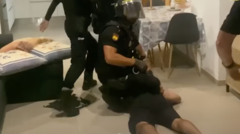Mexican authorities have initiated steps to extradite a prominent figure from the Sinaloa drug cartel, linking him to the high-profile murder of journalist Javier Valdez, a tragic case emblematic of the threats facing reporters in the country.
Mexico Seeks US Extradition of Suspected Mastermind in Journalist's Murder

Mexico Seeks US Extradition of Suspected Mastermind in Journalist's Murder
Mexico requests the extradition of Damaso Lopez Serrano, implicated in the 2017 killing of journalist Javier Valdez, a move highlighting ongoing issues of journalist safety and cartel violence.
The Mexican government has made a formal request for the extradition of Damaso Lopez Serrano, referred to as "Mini Lic," who is believed to have orchestrated the assassination of Javier Valdez in 2017. Valdez was highly regarded for his investigative journalism, particularly focusing on the internal conflicts within the Sinaloa Cartel. On May 15, 2017, Valdez was fatally shot in the streets of Culiacan, just days after publishing critical remarks about Serrano, stating he was "good for chatting but not business."
Mexican Attorney General Alejandro Gertz confirmed that Serrano, a former high-ranking member of the cartel, was identified as the "mastermind" behind the journalist's murder. He noted that despite multiple extradition requests from Mexico, previous US decisions labeled Serrano as a "protected witness" aiding in drug trafficking investigations. This relationship led US authorities to prioritize Serrano’s information over Mexico's demands, despite the evident risks posed to journalists in Mexico.
Serrano’s criminal activities have deep roots, with his father being a key figure alongside infamous cartel leader Joaquin "El Chapo" Guzman. The violence surrounding Valdez's assassination underscored a broader trend of increasing danger for journalists in Mexico; since 1994, over 150 journalists have lost their lives due to their work. In 2022 alone, 15 journalists were killed in acts of violence fueled by organized crime.
In the aftermath of Valdez's passing, investigations led to the incarceration of several direct perpetrators of the crime, yet the alleged planner remains outside Mexico, complicating the pursuit of justice. With recent developments indicating Serrano’s re-arrest for fentanyl trafficking offenses, the Mexican government’s renewed push for extradition may be critical in addressing both Valdez’s case and the protection of journalists in the region.
Recent statistics highlight ongoing violence; for instance, incidents in October saw two additional journalists gunned down in Michoacán and Colima. The persistent threats facing journalists in Mexico demand both domestic and international attention, with calls for safety reforms gaining momentum as the country grapples with cartel influence and impunity.
Mexican Attorney General Alejandro Gertz confirmed that Serrano, a former high-ranking member of the cartel, was identified as the "mastermind" behind the journalist's murder. He noted that despite multiple extradition requests from Mexico, previous US decisions labeled Serrano as a "protected witness" aiding in drug trafficking investigations. This relationship led US authorities to prioritize Serrano’s information over Mexico's demands, despite the evident risks posed to journalists in Mexico.
Serrano’s criminal activities have deep roots, with his father being a key figure alongside infamous cartel leader Joaquin "El Chapo" Guzman. The violence surrounding Valdez's assassination underscored a broader trend of increasing danger for journalists in Mexico; since 1994, over 150 journalists have lost their lives due to their work. In 2022 alone, 15 journalists were killed in acts of violence fueled by organized crime.
In the aftermath of Valdez's passing, investigations led to the incarceration of several direct perpetrators of the crime, yet the alleged planner remains outside Mexico, complicating the pursuit of justice. With recent developments indicating Serrano’s re-arrest for fentanyl trafficking offenses, the Mexican government’s renewed push for extradition may be critical in addressing both Valdez’s case and the protection of journalists in the region.
Recent statistics highlight ongoing violence; for instance, incidents in October saw two additional journalists gunned down in Michoacán and Colima. The persistent threats facing journalists in Mexico demand both domestic and international attention, with calls for safety reforms gaining momentum as the country grapples with cartel influence and impunity.


















